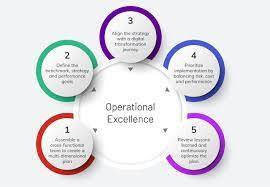- 1-905-452-8193
- Contact Us
- Member Login
- Get Listed Today
- 220,911 members

In today's competitive business landscape, organizations are constantly seeking ways to improve their performance and gain a competitive edge. One of the key strategies that organizations can employ is operational excellence. This approach focuses on optimizing internal processes and systems to achieve higher levels of efficiency and effectiveness. By enhancing operational excellence, organizations can streamline their operations, reduce costs, and deliver superior products and services to their customers.
Operational excellence is a management philosophy that aims to improve organizational performance by focusing on continuous improvement in all aspects of operations. It involves the systematic identification and elimination of waste, inefficiencies, and bottlenecks in processes, as well as the implementation of best practices and standards.
Implementing operational excellence practices can result in numerous benefits for organizations, including:
Increased Efficiency: By identifying and eliminating waste and inefficiencies, organizations can streamline their operations and achieve higher levels of efficiency. This can lead to cost savings and improved productivity.
Enhanced Quality: Operational excellence focuses on standardizing processes and implementing quality control measures. This can result in improved product and service quality, leading to higher customer satisfaction and loyalty.
Reduced Costs: By eliminating waste and inefficiencies, organizations can reduce costs associated with redundant processes, rework, and unnecessary inventory. This can result in significant cost savings over time.
Improved Agility: Operational excellence enables organizations to respond quickly to changing market conditions and customer demands. By streamlining processes and improving flexibility, organizations can adapt more effectively to market dynamics.
Competitive Advantage: Organizations that achieve operational excellence can differentiate themselves from competitors by delivering superior products and services more efficiently. This can result in a sustainable competitive advantage in the marketplace.
To achieve operational excellence, organizations need to embrace key principles and practices:
Continuous Improvement: Operational excellence is a journey, not a destination. It requires organizations to continuously seek opportunities for improvement and innovate their processes and systems.
Standardization: Standardizing processes and implementing best practices helps organizations achieve consistency, reduce errors, and improve quality.
Employee Engagement: Engaging employees in the improvement process is crucial for achieving operational excellence. Employees should be empowered to identify and solve problems, and their input should be valued.
Data-Driven Decision Making: Operational excellence relies on data and metrics to drive decision making. Organizations should collect, analyze, and use data to identify areas for improvement and measure progress.
Customer Focus: Operational excellence is ultimately about delivering value to customers. Organizations should prioritize customer needs and align their operations accordingly.
Enhancing organizational performance through operational excellence is a strategic imperative for organizations in today's competitive business environment. By implementing operational excellence practices, organizations can achieve higher levels of efficiency, reduce costs, improve quality, and gain a competitive advantage. It requires a commitment to continuous improvement, standardization, employee engagement, data-driven decision making, and a customer-centric approach. By embracing these principles, organizations can unlock their full potential and drive sustainable growth and success.
